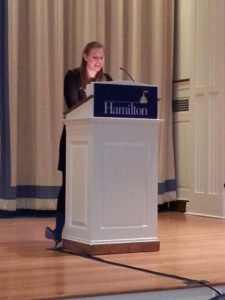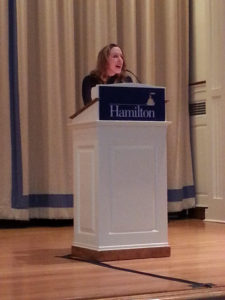On January 25, the Alexander Hamilton Institute for the Study of Western Civilization (AHI), the Manhattan Institute, and the Hamilton College Republican Club co-sponsored a talk and Leadership Dinner by Kimberley Strassel, author of the highly acclaimed The Intimidation Game: How the Left Is Silencing Free Speech (2016). Ms. Strassel, a Wall Street Journal columnist and editorial board member, winner in 2014 of the Bradley Prize given to persons of “extraordinary talent,” spoke about organized assaults on free speech, particularly in recent years by left-wing groups, operating on and off campus.
Elizabeth Barry, leader of the AHI Undergraduate Fellows Program as well as the Hamilton College Republican Club, introduced Ms. Strassel. Liz pointed to the timeliness of the presentation given a disturbing history at Hamilton College: “We’ve had our publications destroyed. We’ve been belittled. We’ve been harassed – both physically and verbally. We’ve been shamed out of classes by both our peers and our professors, almost none of whom could be called conservative. We can no longer participate in debates or discussion for fear of being ridiculed. And the list goes on.”
Ms. Strassel began her talk with an anecdote about her three children who recently were having an argument about free speech. The point made by the youngest, a five-year old, “You can say anything you want as long as I agree with it,” appeared to sum up, Ms. Strassel quipped, the approach by those who seek to limit First-Amendment protections. She traced a decisive shift in tactics by the left to January 21, 2010, when the U.S. Supreme Court decided the case Citizens United v. Federal Election Commission in favor of removing restrictions on political expenditures by certain corporate entities. The Court called them “speech laws” that had restricted corporations from contributing to so-called issue-ads. She explained that excessive governmental restrictions on campaign contributions infringe upon the First Amendment through proxy by eliminating the methods for getting out a message. Today, it is almost impossible to get a message out without money for such things as advertisements, websites, travel expenses, and hall rentals.
In the past, both Democrats and Republicans have used campaign finance laws to restrict the speech of the opposition (Democrats sought to restrict corporations; Republicans sought to restrict unions). The 2002 McCain-Feingold “Bipartisan Campaign Reform Act” was, however, the “Mac Daddy of them all” and was used, mostly by the left, to keep the opposition out of the debate. When the Supreme Court decision was handed down in 2010, the left “freaked out” and then set up a Plan B strategy, one of harassment and intimidation. Senate Democrats demanded that the IRS target certain groups—the AHI was one of those on Lois Lerner’s hit list— opposed to President Obama’s policies. Obama repeatedly raised the specter of “shadowy organizations” and “outside influences,” as the IRS put about 400 applications for non-profit status “on ice.” Top-level IRS officials placed the blame on a couple IRS agents in Cincinnati; the truth was that the strategy, which began before President Obama’s reelection campaign, was deliberate and intended to stifle the political speech of conservative groups, many of them calling themselves tea-party groups. “The IRS knew what it was doing and knew it was wrong,” said Ms. Strassel, pointing to a damning paper trail uncovered.
Ms. Strassel underscored the Wall Street Journal’s role in uncovering the infamous “John Doe” case in Wisconsin in which Milwaukee-area Democratic prosecutors, justifying their actions by an imaginative interpretation of state campaign finance law, conducted secretive investigations into groups supporting Governor Scott Walker and his union reform legislation of 2011. That case involved pre-dawn raids, one of a home inhabited by a teenage son left alone who was threatened by authorities to keep his mouth shut about what happened. He was not allowed to call an attorney nor even his grandparents who lived on the street while the house was being ransacked and computers and other electronic devices impounded. The case went to the Wisconsin Supreme Court. It ruled the prosecutorial behavior misconduct, an attempt to intimidate citizens participating in the political process into drying up their donations to Republicans. As a result of the case, Wisconsin law on prosecutorial conduct was changed.
Other intimidation tactics have included bringing racketeering charges against Exxon for not accepting the left-wing view on climate change. ALEC, the American Legislative Exchange Council, a nonprofit group that writes model free market legislation, was called “racist” after the Trayvon Martin shooting in 2012 for its help in drafting the “stand your ground laws” years earlier. As a result of the activist groups’ intimidation, ALEC lost half of their donors in two months.
On campuses, the intimidation game is played prominently against the Koch Foundation, which supports intellectual diversity and programs to educate students in the principles necessary to maintain a free society. Left-wing professors, Ms. Strassel noted, have no problems taking money in support of programming from left-wing billionaires like Tom Steyer and George Soros. A well-funded organization called “UnKoch My Campus” actually offered students a tool kit for shutting down Koch-supported programs.
Although, as Ms. Strassel stressed, a “bipartisan love of the First Amendment” exists, the intimidation game since before the time of Citizens United is almost exclusively being played these days by the left. The game includes the use of disclosure laws, originally intended to keep track of the activities of politicians, to track down and harass right-of-center citizens. During the heated debate in California over Proposition 8 on the prohibition of same-sex marriage, disclosure laws were used to identify supporters of the proposition. They not only found their names readily available online, but opponents of the measure created a searchable map that identified the homes and addresses of supporters. Many found themselves subject to flash- mob protesters and other forms of harassment. Some of those identified lost their jobs, most famously the CEO of the software firm Mozilla. In fact, Ms. Strassel added, we do not even recognize all the ways that people can be adversely affected by current disclosure laws, such as exclusion from job consideration because of one’s donations. Retribution for “wrong” political views might even extend to preventing the children of conservative donors from playing on a sports team or entering a prestigious private school. In rethinking disclosure laws, Strassel suggested a good beginning would be to make the threshold for identifying donors higher than the current $200.
A number of students and community members asked Strassel questions about such issues as “voter suppression,” retroactive punishments for abuses under the Obama administration, and the lack of checks and balances on campuses. Strassel interviewed about eighty people for the book. What she found most encouraging was how they fought back.
The conversation with Ms. Strassel continued with a large number of students at the reception, book-signing, and dinner hosted by the AHI. “Kim Strassel put on an impressive show,” said AHI Executive Director Robert Paquette. “Smart, funny, personable, and engaging, the attributes that won her the prestigious Bradley Prize were on full display. Students had a terrific time, and they left with a most important message. Be proud of who you are; have the courage of your convictions; push back on the campus thuggery. The AHI has made a great friend in Kimberley Strassel, and we look forward to her next appearance. We are indebted to AHI alumnus Dean Ball, now at the Manhattan Institute, for helping to make this wonderful event happen.”
By Mary Grabar, AHI Resident Fellow



Leave A Comment